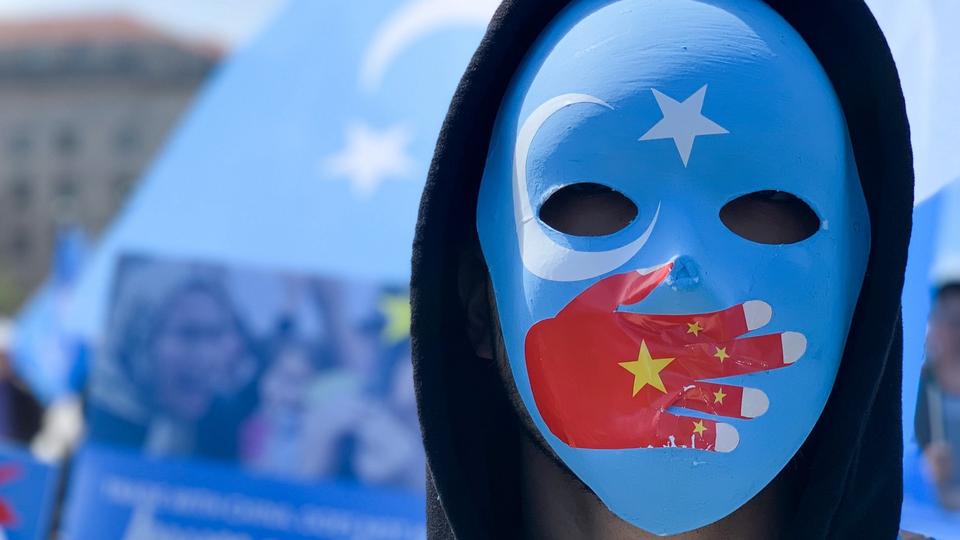Discriminatory detention of Muslim groups in Xinjiang Uighur Autonomous Region may constitute crimes against humanity, says UN human rights office in new report. Beijing "firmly opposes" report release.

The office of UN human rights chief Michelle Bachelet has published its long-awaited report on alleged rights violations in China's western Xinjiang Uighur Autonomous Region, brushing aside Beijing's demands to keep a lid on a report that fanned a tug-of-war for diplomatic influence with the West over the rights of the region's native Uighurs and other predominantly Muslim ethnic groups.
Wednesday's bombshell report, which Western diplomats and UN officials said had been all but ready for months, was published with just minutes to go in Bachelet's four-year term.
The report said serious human rights violations have been committed in the region and "patterns of torture" allegations in Xinjiang are "credible."
"The extent of arbitrary and discriminatory detention of members of Uighur and other predominantly Muslim groups, pursuant to law and policy, in context of restrictions and deprivation more generally of fundamental rights enjoyed individually and collectively, may constitute international crimes, in particular crimes against humanity," the report said.
The report was unexpected to break significant new ground beyond sweeping findings from independent advocacy groups and journalists who have documented concerns about human rights in Xinjiang for years.
But Bachelet's report comes with the imprimatur of the United Nations, and the member states that make it up.
The run-up to its release fuelled a debate over China's influence on the world body and epitomised the on-and-off diplomatic chill between Beijing and the West over human rights, among other sore spots.
Beijing 'firmly opposed' to release
China said it rejects the UN's "so-called Xinjiang-related assessment."
The report is based on the assumption of guilt, uses false information, and is a farce planned by the United States, Western nations and anti-China forces, said Liu Yuyin, spokesperson of the Permanent Mission in Geneva, in a statement.
Hours before the release, China's UN Ambassador Zhang Jun said Beijing remains "firmly opposed" to the release.
"We haven't seen this report yet, but we are completely opposed to such a report, we do not think it will produce any good to anyone," Zhang told reporters outside the Security Council.
"We have made it very clear to the high commissioner and on a number of other occasions that we are firmly opposed to such a report."
"We all know so well that the so-called Xinjiang issue is a completely fabricated lie out of political motivations, and its purpose is definitely to undermine China's stability and to obstruct China's development," he added.
Bachelet said in recent months that she received pressure from both sides to publish, or not publish, the report and resisted it all, treading a fine line all the while noting her experience with political squeeze during her two terms as president of Chile.
In June, Bachelet said she would not seek a new term as rights chief, and promised the report would be released by her departure date on August 31.
Detention camps or training centres
That led to a swell in back-channel campaigns, including letters from civil society, civilians and governments on both sides of the issue.
She hinted last week her office might miss her deadline, saying it was "trying" to release it before her exit.
Bachelet had set her sights on the Xinjiang region upon taking office in September 2018, but Western diplomats voiced concerns in private that over her term, she did not challenge China enough.
The West alleges China's "mass detention campaign" in Xinjiang swept an estimated million Uighurs and other ethnic groups into a network of prisons and camps.
Beijing rejects such accusations and calls them "training centres".
Social media is bold.
Social media is young.
Social media raises questions.
Social media is not satisfied with an answer.
Social media looks at the big picture.
Social media is interested in every detail.
social media is curious.
Social media is free.
Social media is irreplaceable.
But never irrelevant.
Social media is you.
(With input from news agency language)
If you like this story, share it with a friend!
We are a non-profit organization. Help us financially to keep our journalism free from government and corporate pressure












0 Comments